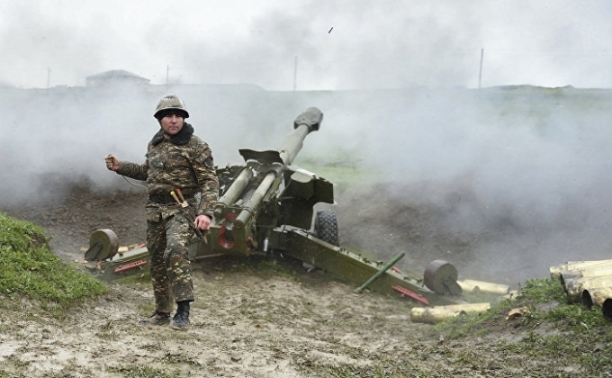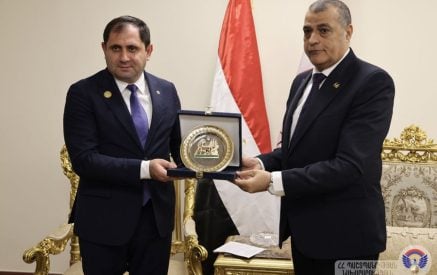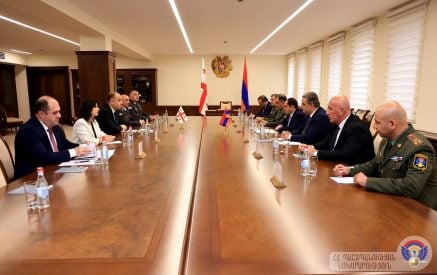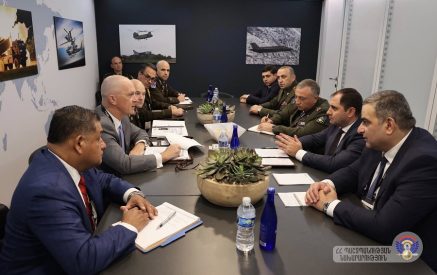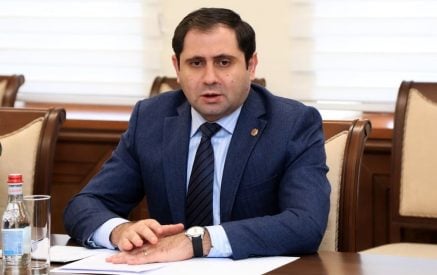International Crisis Group has published a 32-pages report on the Nagorno-Karabakh Conflict, entitled “Nagorno-Karabakh: New Opening, or More Peril?” The report discusses April escalation in the conflict zone and stresses the importance of preventing further escalations. The executive summary and recommendations of the report are presented below.
The pattern of military escalation on the Armenia-Azerbaijan border and Line of Contact (LoC) around Nagorno-Karabakh (NK) since at least 2011 meant it should not have been the surprise it was when major fighting broke out on 2-5 April. In combat that evoked powerful nationalist emotions in both countries and included use of multiple-launch missile systems, heavy artillery, tanks, attack drones and highly trained special forces, Azerbaijan seized small but strategically important pieces of land, and up to 200 people on both sides were killed. That and the acute threat a graver escalation could draw in powerful neighbouring countries have focused the much-needed political attention of key international actors and produced an opportunity to find a peaceful solution to a generation-old conflict, often mistakenly called frozen. It is essential that the parties, urged on by France, Russia and the U.S., as co-chairs of the Minsk Group (MG) of the Organization for Security and Cooperation in Europe (OSCE), the diplomatic point body, make a decisive push for progress in peace talks.
Resumed military escalation would likely be far more destructive than the April flare-up. There is a serious risk that long-range ground-to-ground missiles would be used and casualties, particularly civilian, be much higher in the effort to gain a decisive ground advantage. In the wake of the April fighting, the publics in Armenia and Azerbaijan are more ready for military solutions than at any time in 25 years. Russia sees itself as the regional arbiter which is bound to intervene, not least because of its tight treaty relations with Armenia. Besides mutual affinity based partly on ethnic kinship, Turkey has military cooperation, a critical energy partnership and close political and economic relations with Azerbaijan. It links normalisation of relations with Armenia, including reestablishment of diplomatic ties and opening of their border, – to progress on resolution of the conflict.
The regional context has changed profoundly in the last year, increasing the potential for wide fallout if fighting resumes. Moscow’s and Ankara’s ties are strained. Iran is still defining its approach to the region but has flagged an interest in a greater role. Russia and the West remain at odds, with differences in Eastern Europe perhaps even greater than in Syria. Interests do align in pushing for progress on the NK conflict, but Moscow, which profiles itself as the key mediator and security guarantor, also seeks thereby to strengthen its strategic stake a region it considers a sphere of privileged interest, including by forging a closer relationship with Baku. Moreover, while Moscow has the political will and clout to drive the process, its regional role has been divisive, so it needs the other co-chairs to make the process genuinely credible. France and the U.S. should ensure this cooperation is indeed substantive.
Read also
The talks the Armenian and Azerbaijani presidents agreed to on 16 May to pave the way for negotiations on a comprehensive settlement can be a chance to get a peace process back on track. However, the statement issued after the follow-on talks in St. Petersburg on 20 June suggest momentum might already be weakening. All the Minsk Group co-chairs should engage in the mediation effort at a senior political level in order to lend it the necessary weight and sense of urgency. For progress toward an eventual comprehensive settlement to be possible, there must also be parallel movement on confidence and security building measures (CSBMs), including the OSCE investigative mechanism agreed in Vienna to establish responsibility for ceasefire violations. The co-chairs should maintain pressure on the sides to offer concessions, specifically on Armenia to hand over occupied Azerbaijan territory, and on Azerbaijan to accept strong, internationally-backed security guarantees and an interim status for NK. They should also engage Turkey, to encourage it to use its leverage in support of the peace process.
The EU should continue to give its strong political support to the Minsk Group, including through its bilateral relations with Baku and Yerevan, and the leverage negotiation of new agreements with both can provide. It could make a special contribution, in conjunction with key European Union (EU) member states, particularly Germany – the present OSCE chairman-in-office (CiO) and the EU Minsk Group members – by putting on the table concrete offers of assistance to bolster security and other CSBMs. The EU should also plan what substantial expert and financial contribution it could make to a future post-conflict reconstruction effort, including restoration of communications, such as railway rehabilitation.
Finally, the OSCE High Level Planning Group should step up preparatory work on a future peacekeeping force, including by exploring possible contributions. There will be much politics around the composition, but discussion is needed to galvanise planning. The ultimate product could range from deploying monitors drawn from the armed forces of member states to where the opposing armies face each other and civilians from the different ethnic communities live in proximity to each other, to substantial support for the local police.
None of this would yet mean achievement of a final resolution of the Nagorno-Karabakh conflict. But if there is early and coordinated action on the return of occupied territories to Azerbaijan, establishment of credible measures to guarantee security and an interim status for Nagorno-Karabakh, a genuine possibility that the peace process could break out of its current impasse and move forward in a positive direction could take shape.
RECOMMENDATIONS
To the Armenian and Azerbaijani leaderships:
Take advantage of the renewed international attention and support for progress in the peace negotiations to make the compromises that would make war less likely and bolster the long-term security of their peoples.
Observe the ceasefire strictly, refrain from provocative rhetoric and create a permanent channel of communication in which to discuss the situation on the international border and the LoC and prepare meetings at head of state and foreign minister level.
To the Minsk Group co-chairs and other members, the EU and the OSCE CiO:
Stress to the Armenian and Azerbaijani leaderships, through high-level political engagement, the importance of seizing the opportunity before them, because a new, more serious escalation is likely if progress on CSBMs and toward comprehensive settlement is slow.
Prepare the sides for compromise by renewing efforts to encourage dialogue between Armenians, including in Nagorno-Karabakh, and Azerbaijanis, including internally displaced persons (IDPs), to develop ideas to promote people-to-people contacts, transparency and accountability in the mediation process and public discussion about how a solution of the conflict would be implemented; and work with officials, media and civil society groups as part of that dialogue.
The OSCE CiO (Germany) should assist the Minsk Group (MG) co-chairs (France, Russia, the U.S.) with offers of practical support, including assistance with an investigative mechanism and an enhanced monitoring role for the CiO’s Special Representative; and press for reestablishment of a hotline between the two countries’ militaries.
Give the work of the OSCE High Level Planning Group new impetus by considering modalities, including exploring offers of personnel for deployment of monitors, police and peacekeepers.
The EU should use all leverage in its bilateral relationships with Armenia and Azerbaijan, including the discussions on new agreements with both, to press for a renewed commitment to work for peace; and its High Representative for Foreign Affairs and Security Policy (HR) should continue to lend explicit political support to the efforts of the MG co-chairs, including by direct contact with the Armenian and Azerbaijani presidents in the run-up to their meetings.
To capitalise on the EU’s traditional strength and in the event peace talks lead to progress, the HR, actively supported by France and other EU members of the MG, should commission, and the EU’s Special Representative (EUSR) should lead, work on a plan of support for the reconstruction of Nagorno-Karabakh and the adjacent occupied territories and restoration of physical communications.
The U.S. and EU should encourage Turkey to support the efforts of the MG co-chairs to make progress in peace negotiations on NK in its statements and actions. International actors stress Turkey should move toward normalising its relations with Armenia, including by opening the borders, without preconditions but Turkey has linked this with progress in the peace negotiations; Ankara should at least clarify what level of progress it seeks and make firm commitments accordingly.




















































